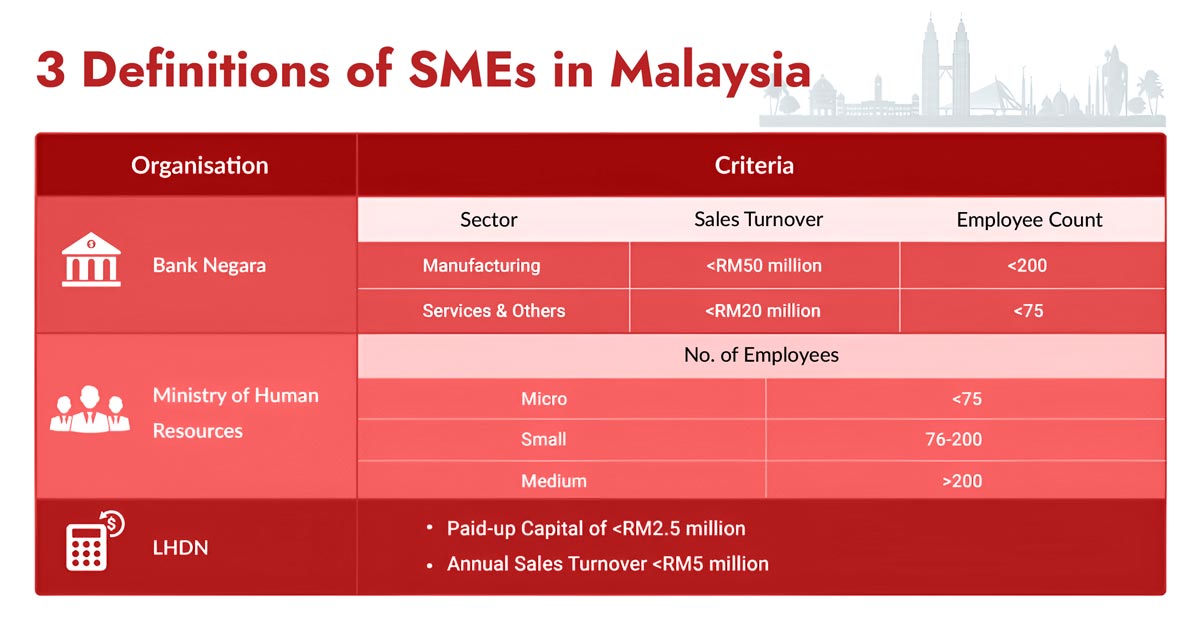Small and medium-sized enterprises (SMEs) represent 98.5% of all registered businesses in Malaysia. SMEs in Malaysia contribute approximately RM521.7 billion to the Malaysia GDP or 38.3% of national GDP (in 2018). Also, it is important to note how SME businesses contribute about 66.2% to the total employment in Malaysia.
The definition of an SME (as defined below) is important for access to finance and government support programmes targeted specifically at SME businesses. The composition of activities undertaken by SMEs are as follows:
| Task | Hours per day |
|---|---|
| Services | 62.4 |
| Manufacturing | 20.1 |
| Agriculture | 10.1 |
| Construction | 5.9 |
| Others | 1.5 |
The main factors determining whether an enterprise is an SME are:
- Staff Headcount
- Annual Sales Turnover
- Paid-up Capital
Related Read: Special Tax Deduction on rental reduction given to SME tenants »
Table of Contents
1. Definition of SMEs in Malaysia by Bank Negara – Financial Institutions
Bank Negara Malaysia (Central Bank of Malaysia) has revised the definition of SMEs through a notification issued on 27 December 2017 which details are as follows:
- Manufacturing: Sales turnover not exceeding RM50 million OR full-time employees not exceeding 200 workers; and
- Services and other sectors: Sales turnover not exceeding RM20 million OR full-time employees not exceeding 75 workers.
| Sectors | Micro | Small | Medium |
|---|---|---|---|
| Manufacturing | Annual sales turnover is less than RM300,000 OR Number of full time employees is less than 5 |
Annual sales turnover is from RM300,000 to less than RM15 million OR Number of full time employees is from 5 to less than 75 |
Annual sales turnover is from RM15 million to less than RM50 million OR Number of full time employees is from 75 to less than 200 |
| Services and Other Sectors | Same as manufacturing sector | Annual sales turnover from RM300,000 to less than RM3 million OR Number of full time employees is from 5 to less than 30 |
Annual sales turnover is from RM3 million to less than RM20 million OR Number of full time employees is from 30 to less than 75 |
2. Definition of SMEs in Malaysia by LHDN – Tax Authority
According to Lembaga Hasil Dalam Negeri (LHDN) in Malaysia, the following highlights the definitions of SMEs in Malaysia:
- SME is defined as a company resident in Malaysia which has a paid-up capital of RM2.5 million or less and is not related to any company with paid-up capital of more than RM2.5 million
- Annual sales turnover not more than RM5 million
3. Definition of SMEs in Malaysia by Ministry of Human Resources
The Ministry of Human Resources defines SMEs in Malaysia by their categories according to the number of employees they hire. The categories are summarised below:
| Sectors | Micro | Small | Medium |
|---|---|---|---|
| Employee number (include foreign workers and expatriates) |
<75 | 76 to 200 | >200 |
Related Read: RM3,000 Special Grant for Micro Enterprises »
To sum up, SMEs in Malaysia open up numerous economic opportunities and their contributions to the Malaysian GDP cannot be overlooked. SMEs play a significant role in encouraging growth, employment, and income as the economy progresses in Malaysia. At WeCorporate, we help SMEs in setting up a company in Malaysia. Kickstart your SME business venture by engaging our wide range of services!
FAQs
- SMEs contribute about 66.2% to the total employment in Malaysia.
-
The 3 main factors that determine whether an enterprise is an SME or not are:
- Staff headcount
- Annual sales turnover
- Paid-up capital
- The following below highlights the key definitions of SMEs by LHDN:
- Company resident in Malaysia with paid-up capital of RM2.5 million or less
- Not related to any company with paid-up capital of more than RM2.5 million
- Annual sales turnover not more than RM5 million
- The Ministry of Human Resources defines SMEs by their categories according to the number of employees they hire, including foreign workers and expatriates.

Incorporate your SME in Malaysia with us!
Join the other SMEs in Malaysia by engaging our incorporation packages tailored to your business.
